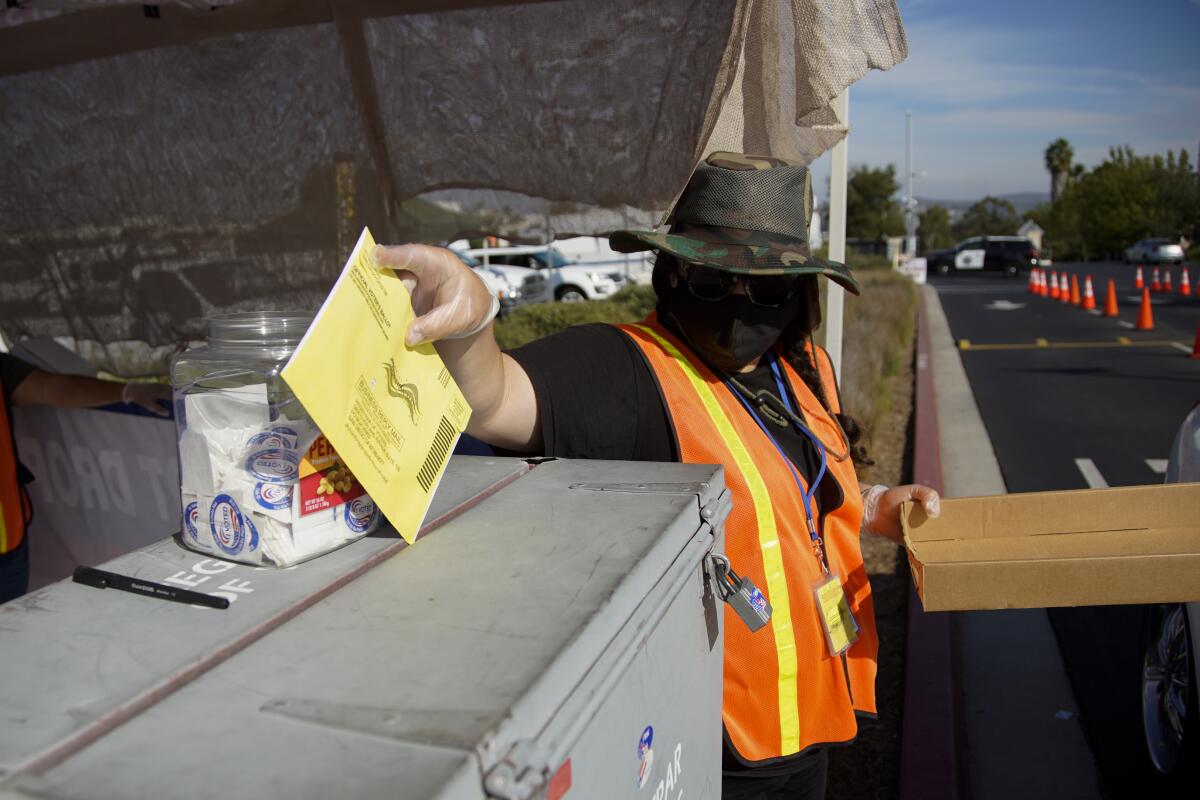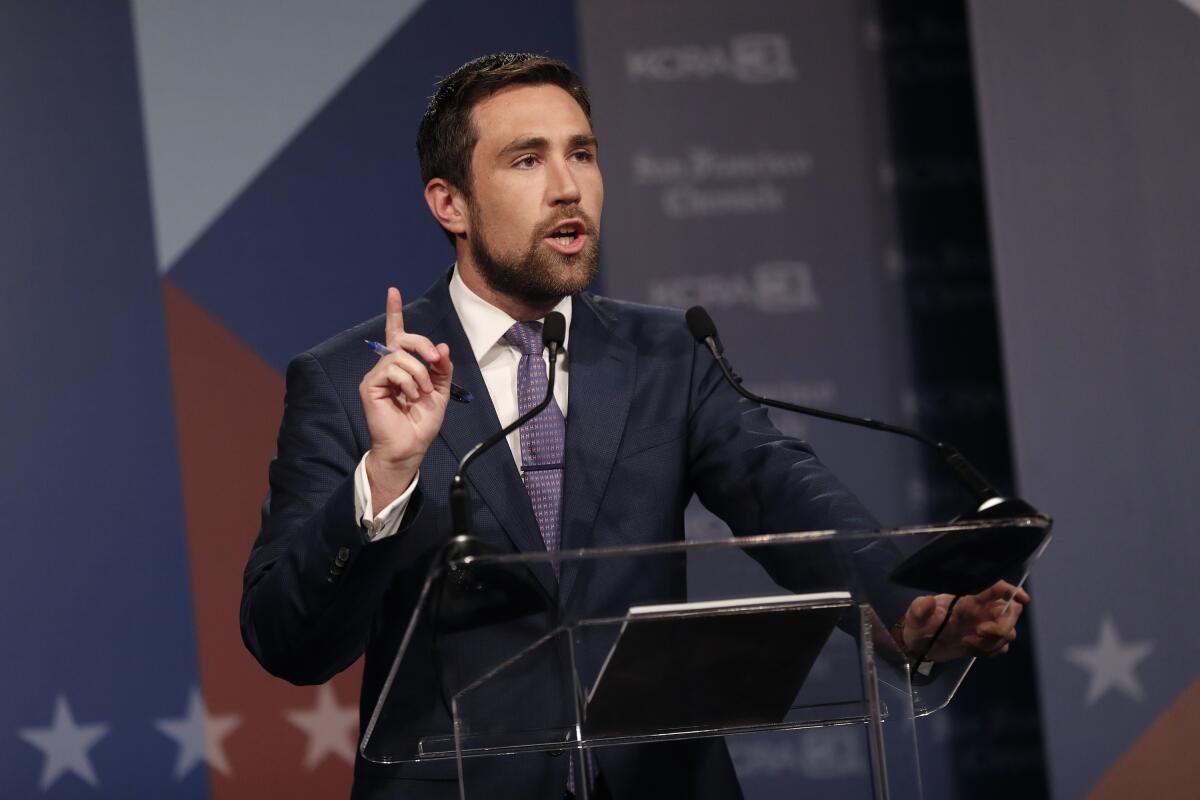California Politics: Who are the recall election’s early voters?

- Share via
If there’s been one constant in the California recall election, it’s that the political fate of Gov. Gavin Newsom rests on the relative enthusiasm of his fellow Democrats to cast ballots and keep him in office.
Polling from last month suggested there was enough Democratic indifference for Newsom to lose the election — a result that would be an abrupt and historic turn of events for a governor elected less than three years ago by the widest margin in more than a generation.
Now, as election day approaches, we’re getting our first real-time glimpse of voter enthusiasm.
The early numbers look good for Democrats. But Republicans are betting on a late-breaking wave of pro-recall ballots — a wave probably too small to sink Newsom if Democrats turn out in numbers that parallel their true electoral strength but possibly enough to capsize the once-unsinkable governor if his supporters leave their ballots unopened or skip the option of in-person voting.
12% of ballots have been collected
State elections officials on Thursday released their first snapshot of voter participation in the gubernatorial recall, putting the number of ballots collected across California at almost 2.7 million — roughly 12% of the 22.2 million ballots mailed earlier this month.
While Los Angeles and Orange counties have reported returned ballot counts consistent with the statewide average, the early response has been huge in Bay Area counties that are solidly Democratic. San Francisco reported 23% of its ballots have been returned, Alameda County reported 18% of its ballots are back in the hands of elections officials and Santa Clara County reported almost 17% of ballots have been cast.
Compare that with counties where Republicans hold sway: 11% of ballots returned in Riverside County, less than 10% in San Bernardino County, only 7% in Fresno County and a scant 1.9% of ballots returned in Kern County, according to the state survey.
Those trends align with a tracker of returned ballots designed by Paul Mitchell, a political data analyst whose firm, Political Data Inc., provides information for Democratic candidates and campaigns. Mitchell’s numbers include ballot counts by political party and, as of Thursday, showed 55% of ballots that have been collected were cast by Democrats and 23% were cast by Republicans. Twenty-two percent of the state’s cast ballots came from independent voters or voters registered to other parties.
Now, the disclaimer: This is a snapshot and a lot can and probably will change over the next two weeks. Mitchell said Thursday he’s surprised the voting patterns of 2020 are still holding up — Democrats boasting on social media of ballots already cast, Republicans either holding on to their ballots or perhaps deciding to surrender those mailed ballots and vote in person closer to election day.
The analysis from Mitchell’s firm also sorts ballots by the age of voters and uses census data and other resources to track voters by race and ethnicity. A large majority of the returned ballots (71%) came from voters age 50 or older in the private survey. And most of the ballots returned so far are from white voters with just 16% cast by Latinos — something worth watching over the next couple of weeks.
Fact check: Ballots aren’t being ‘counted’
One particularly viral — and false — story in circulation on social media is that the ballots that have been collected have already been “counted” by elections officials and thus there’s an effort underway to ensure Newsom prevails.
Nope.
State election law allows ballots to be processed when they arrive — signatures on envelopes checked, a voter’s eligibility confirmed, torn ballots tended to — at any time over the 29 days before Sept. 14. But the votes aren’t tallied by counties until after the polls close at 8 p.m. on election night.
Not all of the confusion can be blamed on false accusations. A number of voters, after returning their ballots, have received an auto-generated text or email that says the ballot has been “received and counted.” It was a poor choice of words that, given the heightened concerns these days about elections, has left some voters unsettled.

Three Kevins and ‘The Beast’
We’ll know in a few weeks whether the gamble made by Democrats to ignore the race between recall replacement candidates paid off. But Wednesday night’s televised debate offered a glimpse at why Newsom’s supporters want to keep the focus on Republicans.
It was the first forum in which a Democratic replacement candidate was invited to participate. And from the get-go, YouTube presenter Kevin Paffrath made it clear that he’s no fan of the incumbent governor.
“I have a bone to pick with Gov. Newsom,” Paffrath said in a lengthy critique of California’s approach to wildfires. A little later in the debate, after rejecting the Democratic Party’s viewpoint that the recall is a Republican effort, Paffrath urged voters to start fresh.
“We’ve got to go out with the old and in with the bold, and that’s what I bring,” he said.
In all, three men named Kevin were onstage: Paffrath, former San Diego Mayor Kevin Faulconer and Rocklin Assemblyman Kevin Kiley. The odd man out, at least by name, was businessman John Cox — whose “The Beast” moniker took another odd turn Thursday with a new TV ad again starring the now-familiar Kodiak bear and ending with Cox being bleeped for using a four-letter word.
But back to the debate.
Paffrath promised to build a water pipeline to the Mississippi River if elected. Cox promised sweeping tax cuts. Kiley stayed on message about his conservative, anti-Newsom agenda. And presumed Republican front-runner Larry Elder was a no-show again.
For Republicans, there’s a clear difference of opinion on strategy: Faulconer, touting a variety of positions to the left of the GOP base, seems to be running as though it’s a general election in which he wants (needs, actually) crossover voters. That helps explain why he touted this week’s endorsement by Michael Shellenberger, a longtime Democrat and activist on homelessness issues. It’s an effort that seems aimed at appealing to Democrats who remain frustrated over their limited choices among the replacement candidates.
Kiley and Cox are running what feels like a primary election — maximizing support among Republicans and hoping for a large enough plurality to prevail should Newsom be recalled. Kiley’s big endorsement this week was former rival Doug Ose, the former GOP congressman who dropped out this month due to health issues.
Elder is also running a primary campaign, which is what made the endorsement he rolled out this week a bit perplexing: Gloria Romero, a former Democratic state senator who in recent years has been a fierce advocate for charter schools. It’s the only part of the Elder playbook that, so far, doesn’t appear targeted to attract GOP voters.
Recall roundup
— Just hours after a deadly attack in Afghanistan that killed U.S. service members, Vice President Kamala Harris canceled plans to speak at a San Francisco rally on Friday to oppose the recall of Newsom.
— Elder’s onetime fiancee said she filed a report with Los Angeles police Wednesday over an incident six years ago in which she said Elder checked to see whether his gun was loaded during an argument about the couple’s breakup.
— Big donors helping the governor fight the recall also have a big wish list in Sacramento should he prevail.
— California’s homicide rise has become a recall rallying cry, but experts question the role of Newsom in what’s playing out across the state.
— Abortion-rights groups are warning that Californians’ right to an abortion is on the recall ballot. But new restrictions would be difficult for a replacement governor to accomplish with only a little over a year remaining in the term.
— Visit our special site for all of The Times’ recall coverage, including news and opinion offerings on the candidates and issues.
Sneak peek at 2022 propositions
California is in the thick of a recall campaign, but the 2022 election cycle is just around the corner. And August has produced a bumper crop of ballot measure proposals submitted for review and, ultimately, clearance to begin collecting voter signatures for next November.
Seven draft ballot initiatives were submitted this week, bringing the total for August to 11 proposals. They include:
- Two proposals to create a school vouchers system in California, allowing families to access taxpayer funds in annual amounts roughly equal to per-pupil spending in K-12 public schools. One proposal, championed by Michael Alexander of the Pasadena-based School Choice Foundation, includes a prohibition on making eligible students agree to “any state-mandated vaccination, bodily implant or skin marker.” The authors of a second school voucher proposal include Richard Grenell, who served as ambassador to Germany and acting director of national intelligence under former President Trump.
- A proposal to remove the limits placed on parents transferring homes without a property tax reassessment — imposed by voters last year with Proposition 19 — was submitted by Jon Coupal, president of the Howard Jarvis Taxpayers Assn.
- A proposal filed with state officials Thursday would earmark 2% of state general fund tax revenues to boost California’s water supply by at least 5 million acre feet (1.6 trillion gallons) a year.
- In the wake of battles over housing policy in Sacramento, a group including Redondo Beach Mayor Bill Brand has submitted a ballot measure to ensure the power of local officials over land-use decisions.
- Venture capitalist Tim Draper, whose 2018 effort to split California into separate states was blocked by the state Supreme Court, is back with an effort to abolish public employee unions.
- An effort to remove existing legal immunity for law enforcement officers when incidents end in the death of a person was submitted after its backers raised the $2,000 application fee through a GoFundMe campaign.
Enjoying this newsletter? Consider subscribing to the Los Angeles Times
Your support helps us deliver the news that matters most. Become a subscriber.
California politics lightning round
— California lawmakers grapple with whether to impose a statewide COVID-19 vaccination mandate as draft legislation makes its way around the state Capitol.
— Members of the California Assembly who don’t provide proof of a COVID-19 vaccination by next week would be suspended during the final days of this year’s legislative session under a proposal unveiled Wednesday by a Bay Area lawmaker.
— Legislation to speed up an overhaul of California’s unemployment benefits system fizzled Thursday when it was sidelined by Democratic lawmakers.
— The California Supreme Court on Thursday decided to leave the state’s death penalty law intact, refusing an entreaty from Newsom that would have overturned scores of death sentences.
Stay in touch
Did someone forward you this? Sign up here to get California Politics in your inbox.
Until next time, send your comments, suggestions and news tips to politics@latimes.com.
Sign up for Essential California
The most important California stories and recommendations in your inbox every morning.
You may occasionally receive promotional content from the Los Angeles Times.




